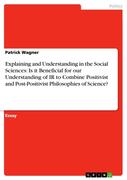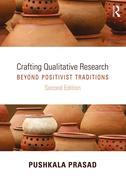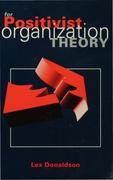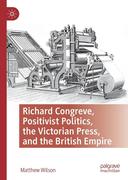30 Results for : positivist
-

Beyond Kyoto
This work seeks do develop an alternative theoreticalframework within the international relationstheorizing that would be better equipped to deal withthe specific character of global environmental issuesthan the mainstream positivist InternationalRelations Theory is. The discussed framework drawsheavily on Andrew Feenberg s two-level critique ofinstrumental reason and it brings in some insightsfrom Social Constructivist Studies in Science andTechnology and Green Political Theory. As such it hasan ambition to broaden the array of existing conceptsand tools of International Political Theory. The book first discusses the concept of instrumentalreason, what is followed by an outline of thetheoretical framework itself. Next, a brief overviewof the current international climate architecture isgiven, what serves as an introduction to thelast-empirical part-of the work, which analyzesKyoto s Clean Development Mechanism and its possiblefuture design in the light of the proposed framework. The work may be interesting especially for politicaltheorists interested in normative reflections onsocial and man-nature relationships.- Shop: buecher
- Price: 50.40 EUR excl. shipping
-

Multispecies Ethnography (eBook, ePUB)
How are natures and animals integrated inclusively into research projects through Multispecies Ethnography? While preceded by a vision that seeks to question holistically how scientists can integrate natures and animals into research projects through Multispecies Ethnography, this book focuses on inter- and multidisciplinary collaboration. From an examination of the interfaces between social and natural science-oriented disciplines, a complex view of natures, humans, and animals emerges. The insights into interdependencies of different disciplines illustrate the need for a Multispecies Ethnography to analyze HumansAnimalsNaturesCultures. While the methodology is innovative and currently not widespread, the application of Multispecies Ethnography in areas of research such as climate change, species extinction, or inequalities will allow new insights. These research debates are closely interwoven, and the methodological inclusion of the agency of natures and animals and the consideration of Indigenous Knowledge allow new insights of holistic multispecies research for the different disciplines. Multispecies Ethnography allows for positivist, innovative, attentive, reflexive and complex analyses of HumansAnimalsNaturesCultures.- Shop: buecher
- Price: 35.95 EUR excl. shipping
-

European Thought and Culture in the 19th Century, Hörbuch, Digital, 739min
In the 19th century, Europe was the crucible for most of the ideas, institutions, and "isms" that now shape the life of our entire planet- nationalism, capitalism, democracy, socialism, feminism, and the list goes on and on. But where did these ideas come from? How did the particular conditions of Europe between the French Revolution and the First World War shape these thinkers' ideas, the thoughts of their critics, the progress of the debates that went on between them, and the wider hearing that all received? Over the course of 24 sweeping lectures, Professor Kramer invites you to view intellectual history as a series of overlapping, interconnected dialogues, which will help you deepen your understanding of the ideas of influential 19th-century European intellectuals; reflect on the interactions between ideas and social experience; and think critically and creatively about how the ideas of 19th-century Europe's leading thinkers and writers still raise a host of cogent questions for our own time. You will examine not only famous thinkers like Marx, Darwin, and Nietzsche, but a number of important, though less well-remembered, figures including the romantic author Germaine de Staël, the positivist Auguste Comte, the novelist and feminist George Sand, the political theorist Benjamin Constant, and many others-each placed in a context and linked both to other creative thinkers and the major issues of the time. Beginning the legacy of the 18th-century Enlightenment and its connection to the French Revolution and ending with the philosophy of Nietzsche, this ambitious course is rich with great-and lasting-ideas. PLEASE NOTE: When you purchase this title, the accompanying reference material will be available in your Library section along with the audio. Language: English. Narrator: Lloyd Kramer. Audio sample: https://samples.audible.de/bk/tcco/000093/bk_tcco_000093_sample.mp3. Digital audiobook in aax.- Shop: Audible
- Price: 9.95 EUR excl. shipping
-

Rethinking Rights (eBook, ePUB)
Re-thinking Rights: Historical Development and Philosophical Justification takes a new look at the history of individual rights, focussing on the way that philosophers have written that history. The scholastics and early modern writers used the notion of natural rights to debate the big moral and political questions of the day, such as the treatment of Indigenous Americans under Spanish rule. John Locke put natural rights at the centre of liberal political thought. But as the idea grew in strength and influence, empiricist and positivist philosophers punctured it with attacks of logical incompetence and illegitimate appeals to theology and metaphysics. Philosophers then turned to law and jurisprudence for the philosophical analysis of rights, where it has largely stayed ever since. Eleanor Curran argues that the dominance of the Hohfeldian analysis of (legal) rights has restricted our understanding of moral and political rights and led to distorted readings of historical writers on rights. It has also led to the separation of right from the important related notion of liberty-freedoms are now seen as inferior to claims. Curran looks at recent philosophy of human rights and suggests a way forward for justifying universal moral and political rights and separating them from legal rights.- Shop: buecher
- Price: 35.95 EUR excl. shipping
-

Instincts, Influence and Psychological Disorders: A Guide for Everyone! , Hörbuch, Digital, ungekürzt, 345min
Individuals are continually discussing "human impulses". A great many people probably won't comprehend what that implies, and this is an expression that was obtained from science. It advises us that, by the day's end, people are merely warm-blooded creatures who developed past the rest. In any case, a few eccentricities make individuals unique creatures. You may have heard some individuals talk about the human nature of endurance, for instance. Regardless of the way that the vast majority accept people have this impulse, you realize that suicide is a day-by-day event in this day and age. You've, additionally, most likely caught wind of sexual desires. However, you recognize that feebleness and other sexual dysfunctions exist.As should be obvious, the point of human impulses doesn't merely end with a natural talk. There's a scope of social and symbolic vectors that impact everything. There are ways of thinking that don't examine impulses by any means. Instead, they talk about "drives".From an organic point of view, human impulses are diagrams for conduct that are inherited and essential over the species. The reason for these instincts is to assist individuals with adjusting to their surroundings. They're pre-customized in the cerebrum itself. These instincts enable you to secure yourself and keep yourself alive. They show themselves as quick or programmed responses.Organic hypothesis demonstrates that people have some essential instincts:Endurance nature: This includes all vital conduct that causes you to save your life and well-being. A few models are the shirking of threat, eating, and the quest for cover.The regenerative nature: This one includes the protection of the species. Mostly, it's about regenerative sexuality.The strict intuition: Even though there's no agreement on this point, most analysts of the positivist school demonstrate that individuals have an inborn need to di ungekürzt. Language: English. Narrator: Harry Thomson. Audio sample: https://samples.audible.de/bk/acx0/184250/bk_acx0_184250_sample.mp3. Digital audiobook in aax.- Shop: Audible
- Price: 9.95 EUR excl. shipping
-

Man, Economy, and State with Power and Market - Scholar's Edition , Hörbuch, Digital, ungekürzt, 3468min
New Edition, with new introduction! Murray N. Rothbard's great treatise Man, Economy, and State and its complementary text, Power and Market, are here combined into a single audiobook edition as they were written to be. It provides a sweeping presentation of Austrian economic theory, a reconstruction of many aspects of that theory, a rigorous criticism of alternative schools, and an inspiring look at a science of liberty that concerns nearly everything and should concern everyone. The Mises Institute's new edition of Man Economy, and State, united with its formerly sundered companion volume, Power and Market, is a landmark in the history of the institute. It takes this book out of the category of underground classic and raises it up to its proper status as one of the great economic treatises of all time, a book that is essential for anyone seeking a robust economic education. The captivating new introduction by Professor Joseph Salerno frames up the Rothbardian contribution in a completely new way and reassesses the place of this book in the history of economic thought. In Salerno's view, Rothbard was not attempting to write a distinctively "Austrian" book but rather a comprehensive treatise on economics that eschewed the Keynesian and positivist corruptions. This is what accounts for its extraordinarily logical structure and depth. That it would later be called Austrian is only due to the long-lasting nature of the corruptions of economics that Rothbard tried to correct. For years the Mises Institute has kept it in print and sold thousands of copies in a nice paperback version. Then we decided to take a big step and put out an edition worthy of this great treatise. It is the Scholar's Edition of Man, Economy, and State - an edition that immediately became definitive and used throughout the world. The index is huge and comprehensive. ungekürzt. Language: English. Narrator: Jeff Riggenbach. Audio sample: https://samples.audible.de/bk/acx0/045044/bk_acx0_045044_sample.mp3. Digital audiobook in aax.- Shop: Audible
- Price: 9.95 EUR excl. shipping
-

Explaining and Understanding in the Social Sciences: Is it Beneficial for our Understanding of IR to Combine Positivist and Post-Positivist Philosophies of Science?
Explaining and Understanding in the Social Sciences: Is it Beneficial for our Understanding of IR to Combine Positivist and Post-Positivist Philosophies of Science? - 1. Auflage: ab 2.99 €- Shop: ebook.de
- Price: 2.99 EUR excl. shipping
-

Crafting Qualitative Research
Crafting Qualitative Research - Beyond Positivist Traditions. 2. Auflage: ab 63.99 €- Shop: ebook.de
- Price: 63.99 EUR excl. shipping
-

For Positivist Organization Theory
For Positivist Organization Theory: ab 56.49 €- Shop: ebook.de
- Price: 56.49 EUR excl. shipping
-

Richard Congreve Positivist Politics the Victorian Press and the British Empire
Richard Congreve Positivist Politics the Victorian Press and the British Empire: ab 90.99 €- Shop: ebook.de
- Price: 90.99 EUR excl. shipping